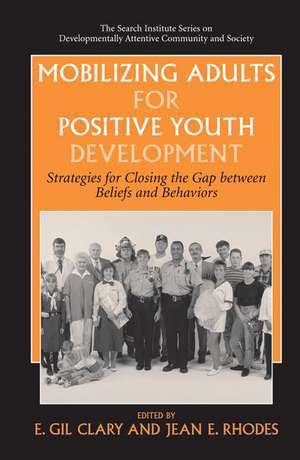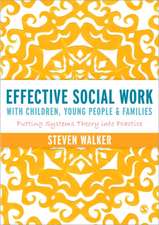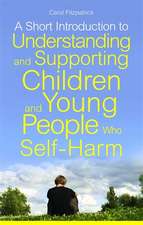Mobilizing Adults for Positive Youth Development: Strategies for Closing the Gap between Beliefs and Behaviors: The Search Institute Series on Developmentally Attentive Community and Society, cartea 4
Editat de E. Gil Clary, Jean E. Rhodesen Limba Engleză Hardback – 16 mar 2006
| Toate formatele și edițiile | Preț | Express |
|---|---|---|
| Paperback (1) | 696.50 lei 6-8 săpt. | |
| Springer Us – 27 oct 2010 | 696.50 lei 6-8 săpt. | |
| Hardback (1) | 643.34 lei 6-8 săpt. | |
| Springer Us – 16 mar 2006 | 643.34 lei 6-8 săpt. |
Preț: 643.34 lei
Preț vechi: 756.86 lei
-15% Nou
Puncte Express: 965
Preț estimativ în valută:
123.10€ • 127.00$ • 102.73£
123.10€ • 127.00$ • 102.73£
Carte tipărită la comandă
Livrare economică 27 martie-10 aprilie
Preluare comenzi: 021 569.72.76
Specificații
ISBN-13: 9780387291734
ISBN-10: 0387291733
Pagini: 276
Ilustrații: X, 276 p.
Dimensiuni: 155 x 235 x 19 mm
Greutate: 0.5 kg
Ediția:2006
Editura: Springer Us
Colecția Springer
Seria The Search Institute Series on Developmentally Attentive Community and Society
Locul publicării:New York, NY, United States
ISBN-10: 0387291733
Pagini: 276
Ilustrații: X, 276 p.
Dimensiuni: 155 x 235 x 19 mm
Greutate: 0.5 kg
Ediția:2006
Editura: Springer Us
Colecția Springer
Seria The Search Institute Series on Developmentally Attentive Community and Society
Locul publicării:New York, NY, United States
Public țintă
ResearchCuprins
and Conceptual Foundations.- and Conceptual Foundations.- The Context of Adults Helping Youth Develop.- Young People Are Resources to Be Developed: Promoting Positive Youth Development through Adult-Youth Relations and Community Assets.- The World of Adults Today: Implications for Positive Youth Development.- Mobilizing Individual Adults.- Lessons from Research on Volunteering for Mobilizing Adults to Volunteer for Positive Youth Development.- Generativity and Adult Development: Implications for Mobilizing Volunteers in Support of Youth.- Strategies to Motivate Behavior Change: How Can We Mobilize Adults to Promote Positive Youth Development?.- Mobilizing Local Groups of Adults.- Best Practices of Prosocial Organizations in Youth Development.- Mobilizing Communities for Positive Youth Development: Lessons Learned from Neighborhood Groups and Community Coalitions.- Mobilizing Adults for Positive Youth Development: Lessons from Religious Congregations.- Bridging Research and Community Practice in the Field of Youth Development through University Outreach.- Mobilizing Societies of Adults.- Public Policy: Encouraging Adult Voluntarism with Young People.- Lessons from Research on Social Marketing for Mobilizing Adults for Positive Youth Development.- Think Globally, Act Locally: A Global Perspective on Mobilizing Adults for Positive Youth Development.- Commentary.- Promoting Positive Youth Development: Challenges Posed and Opportunities Provided.
Recenzii
From the reviews:
“The volume provides a number of insightful perspectives on positive youth development. … The authors' focus on social solidarity with youths and adults working together is excellent and refreshing. … Mobilizing Adults effectively uses developmental assumptions and theories … for positive youth development. … three broad groups would likely find the book to be a useful reference: (a) Those who do research on youth programs, (b) individuals who work with youths and organize programs to serve them, and (c) policy makers … .” -(Michelle E. Schmidt, PsycCRITIQUES, 52:8, 2007)
"The edited volume … is a collection of applied essays that attempt to draw volunteer recruitment strategies from the research literature in a range of fields. The book is divided into ecological strata that reveal potential sources of volunteers for youth development programs. … This book is rich in examples, and it steers readers towards key research literatures and the strategies they reveal. The book is as much about who volunteers are as it is about how and where to find them." (Michael J. Karcher, Journal of Youth and Adolescence, Vol. 37, 2008)
“The volume provides a number of insightful perspectives on positive youth development. … The authors' focus on social solidarity with youths and adults working together is excellent and refreshing. … Mobilizing Adults effectively uses developmental assumptions and theories … for positive youth development. … three broad groups would likely find the book to be a useful reference: (a) Those who do research on youth programs, (b) individuals who work with youths and organize programs to serve them, and (c) policy makers … .” -(Michelle E. Schmidt, PsycCRITIQUES, 52:8, 2007)
"The edited volume … is a collection of applied essays that attempt to draw volunteer recruitment strategies from the research literature in a range of fields. The book is divided into ecological strata that reveal potential sources of volunteers for youth development programs. … This book is rich in examples, and it steers readers towards key research literatures and the strategies they reveal. The book is as much about who volunteers are as it is about how and where to find them." (Michael J. Karcher, Journal of Youth and Adolescence, Vol. 37, 2008)
Notă biografică
E. Gil Clary, Ph.D., is chair of the department of psychology at the College of St. Catherine in St. Paul, Minnesota. He teaches General Psychology, Experimental Social Psychology, and Personality Theories. Furthermore, he has taught, in collaboration with colleagues in other departments, two honors seminars, one on autobiographies, and a second on the meaning of work.
He completed his education at the University of Georgia (B.A. in psychology, 1975; M.S. in psychology, 1978; Ph. D. in social psychology, 1980). In 1979, he joined the faculty of the College of St. Catherine, first as an instructor (1979-1980), then assistant professor (1980-1985), associate professor (1985-1992), and professor (1992). From 1989 to 1992, Clary was the Endowed Professor of the Sciences at the College of St. Catherine. In 1997, he assumed the position of chair of the department of psychology.
Most of Clary's research centers on the psychology of helping, with much of this focusing on people's involvement in volunteer activities and other forms of community services. More specifically, this research has examined the motivations underlying participation in volunteer work, and with Mark Snyder (University of Minnesota) and other colleagues, this work has resulted in a psychometrically sound inventory for assessing motivations underlying involvement in volunteer work. Finally, this interest in volunteerism recently resulted in a study of the effects of educational programs requiring students to volunteer. Jean E. Rhodes, Ph.D., is a professor in the Department of Psychology, University of Massachusetts, Boston. She has written extensively on the role of mentors in promoting positive developmental outcomes among children and adolescents. In addition to studying natural mentors, she and her colleagues have analyzed longitudinal data that were collected from over 1,000 urban adolescents who participated in a national study of Big Brothers BigSisters. The predictors and effects of relationship duration have been studied, as well as the processes that govern mentors' influence. Her findings provide ample evidence of the extraordinary potential of mentoring relationships, while also exposing the rarely acknowledged risk for harm that unsuccessful relationships can render. A deeper understanding of these important relationships may lead to interventions and policies that better address the needs of youth.
Rhodes is currently involved in studies on the role of supportive relationships in the lives of: young mothers; students in school and after-school settings; and immigrant youth. She is a Fellow of APA and the Society for Community Research and Action, a member of the MacArthur Network on the Transition to Adulthood, and author of a monthly research column for the National Mentoring Partnership. Her book, Stand by me: The risks and rewards of youth mentoring, was published by Harvard University Press in Spring 2002.
He completed his education at the University of Georgia (B.A. in psychology, 1975; M.S. in psychology, 1978; Ph. D. in social psychology, 1980). In 1979, he joined the faculty of the College of St. Catherine, first as an instructor (1979-1980), then assistant professor (1980-1985), associate professor (1985-1992), and professor (1992). From 1989 to 1992, Clary was the Endowed Professor of the Sciences at the College of St. Catherine. In 1997, he assumed the position of chair of the department of psychology.
Most of Clary's research centers on the psychology of helping, with much of this focusing on people's involvement in volunteer activities and other forms of community services. More specifically, this research has examined the motivations underlying participation in volunteer work, and with Mark Snyder (University of Minnesota) and other colleagues, this work has resulted in a psychometrically sound inventory for assessing motivations underlying involvement in volunteer work. Finally, this interest in volunteerism recently resulted in a study of the effects of educational programs requiring students to volunteer. Jean E. Rhodes, Ph.D., is a professor in the Department of Psychology, University of Massachusetts, Boston. She has written extensively on the role of mentors in promoting positive developmental outcomes among children and adolescents. In addition to studying natural mentors, she and her colleagues have analyzed longitudinal data that were collected from over 1,000 urban adolescents who participated in a national study of Big Brothers BigSisters. The predictors and effects of relationship duration have been studied, as well as the processes that govern mentors' influence. Her findings provide ample evidence of the extraordinary potential of mentoring relationships, while also exposing the rarely acknowledged risk for harm that unsuccessful relationships can render. A deeper understanding of these important relationships may lead to interventions and policies that better address the needs of youth.
Rhodes is currently involved in studies on the role of supportive relationships in the lives of: young mothers; students in school and after-school settings; and immigrant youth. She is a Fellow of APA and the Society for Community Research and Action, a member of the MacArthur Network on the Transition to Adulthood, and author of a monthly research column for the National Mentoring Partnership. Her book, Stand by me: The risks and rewards of youth mentoring, was published by Harvard University Press in Spring 2002.
Textul de pe ultima copertă
When highly successful people from all walks of life are asked how they were able to attain such lofty achievements, they inevitably pay tribute to the influential role played by a variety of adults throughout their young lives. Whether it’s a valedictorian delivering the commencement speech, a team captain receiving an MVP award, or an actor accepting an award, the underlying message each sends is clear: Throughout childhood and adolescence, they had consistent, meaningful interaction with adults.
In today’s fast-paced, often-dehumanizing world, increasing positive adult involvement and influence is particularly vital. To further that goal, Mobilizing Adults for Positive Youth Development: Strategies for Closing the Gap between Beliefs and Behaviors brings together, in one concise volume, the advice and expertise of leading scholars dedicated to affecting positive youth development. Taken together, the chapters in this book provide a multifaceted, multidisciplinary blueprint for social change. The volume includes much-needed information on:
In today’s fast-paced, often-dehumanizing world, increasing positive adult involvement and influence is particularly vital. To further that goal, Mobilizing Adults for Positive Youth Development: Strategies for Closing the Gap between Beliefs and Behaviors brings together, in one concise volume, the advice and expertise of leading scholars dedicated to affecting positive youth development. Taken together, the chapters in this book provide a multifaceted, multidisciplinary blueprint for social change. The volume includes much-needed information on:
- Understanding the current state of youth development work; the world in which adolescents live; and the world in which adults function, as well as the context in which adults can establish adult-youth relationships and use community resources to ensure a successful youth development outcome.
- Promoting individual adult involvement in adolescents’ lives to ensure positive youth development.
- Mobilizing individual adults through a variety of outlets, including neighborhood and community coalitions, religious institutions, and university outreach programs.
- Mobilizing a society of adults, through volunteer and other programs.
Caracteristici
Makes available the advice and expertise of leading scholars dedicated to affecting positive youth development Provides a multifaceted, multidisciplinary blueprint for social change Offers a comprehensive overview of the current state of youth development work Promotes individual adult involvement in adolescents’ lives to ensure positive youth development Provides a blueprint for mobilizing a society of adults, through volunteer and other programs, to improve the lives of youth Includes supplementary material: sn.pub/extras



























